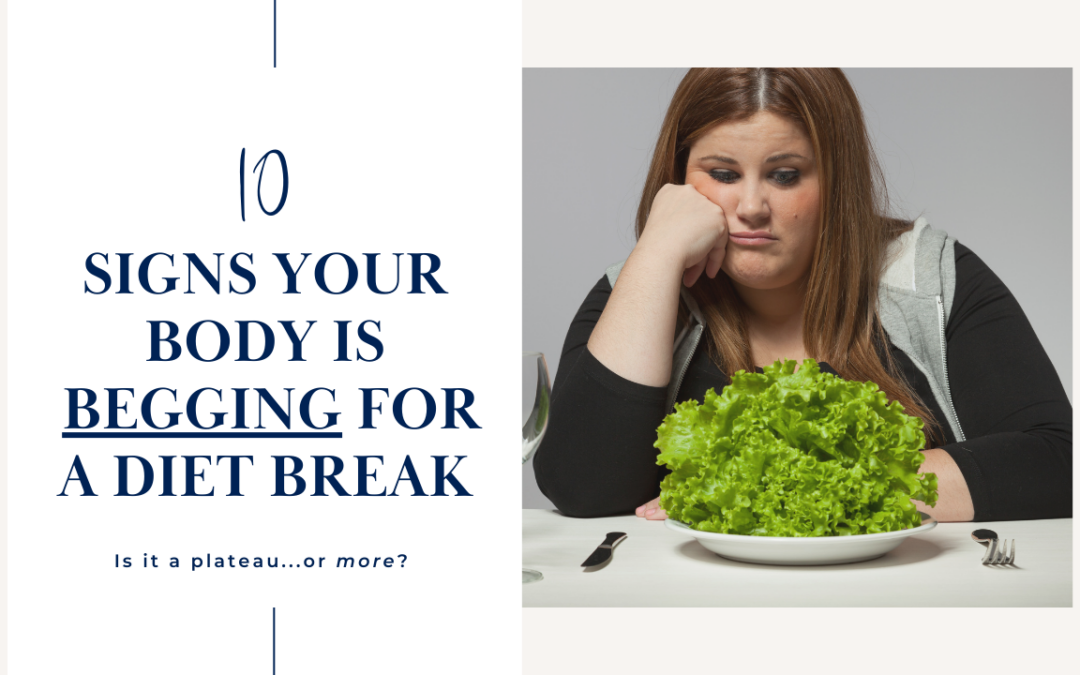When was your last diet break?
If you’re a woman over 40, looking to lose weight …again …chances are, you’re no stranger to “the plateau.” For most, when fat loss stalls, they instinctively want to lower calories EVEN further – which may potentially do more harm than good. Though the thought of increasing food intake when the scale won’t budge is likely the last thing on your mind – it may be exactly what your body is asking…erm…begging for. In this podcast, we’ll explore the concept of diet breaks, debunk common myths, and help you find the right balance for your unique needs.
What Are Diet Breaks?
Diet breaks involve temporarily increasing your calorie intake to maintenance levels for a specific period. This strategic approach provides your body with a much-needed respite from caloric restriction, offering numerous benefits for both physical and mental health.
-
- Decreasing your calories causes your metabolism to slow down to accommodate the smaller amount of food intake.
-
- Slower metabolism = slower fat loss.
-
- When your calories are too low for too long, your body begins to adjust, making the reduced calorie level your new maintenance. (this can happen in as quickly as 3 weeks!)
-
- By taking a diet break, you essentially “remind” your body of what maintenance ACTUALLY is. This will help keep your metabolism revving higher, aiding the fat loss process once you reduce the calories again.
-
- More importantly, a diet break can also serve as a psychological break if you’re under severe stress, or struggling with sticking with your plan.
Diet breaks can come in several forms, from the classic “cheat meal” (a “re-feed” day – on purpose! No need to cheat!), to a full diet break which can last for a couple of weeks, to a metabolism reset.
Debunking Common Misconceptions
Let’s address some common misconceptions that women over 40 may have about diet breaks:
Age Limits Progress: Contrary to the belief that age limits progress, your body’s adaptability remains relevant. Diet breaks can positively impact your fitness journey at any age.
Hormones Are All That Matter: While hormonal shifts during perimenopause and menopause play a role, balanced nutrition, including diet breaks, is still effective in achieving your health goals.
Extreme Measures Are Necessary: Extreme diets and intense exercise are not the only solutions. Diet breaks offer a balanced and sustainable alternative, preventing burnout and health issues.
Always Pursue Caloric Deficits: Constant caloric deficits can negatively impact hormones, muscle mass, and well-being. Diet breaks counteract these effects, contributing to long-term success.
Fear of Weight Gain: A well-structured diet break is designed to prevent excessive weight gain while providing various health benefits. Fear of gaining weight shouldn’t hinder you from considering a diet break.
Neglecting Nutrient Intake: Focusing solely on calories overlooks the importance of consuming adequate nutrients for overall health. Diet breaks address nutrient deficiencies and promote well-being.
One-Size-Fits-All Approach: Women over 40 have unique health considerations, and a tailored approach is essential for diet breaks to be effective.
Prioritizing Short-Term Results: Prioritizing short-term results can hinder progress. Diet breaks contribute to sustainable long-term results by promoting metabolic health and preventing burnout.
Relying Solely on Exercise: Both exercise and nutrition are crucial, especially as we age. Relying solely on exercise to offset a poor diet is a misconception. Both aspects need to be balanced for optimal results.
Neglecting Self-Care and Rest: Neglecting self-care and rest can impact your body’s response to diet and exercise efforts. Prioritizing sleep, stress management, and self-care is crucial for successful diet breaks.
10 Signs That Indicate the Need for a Diet Break
Now, let’s explore the signs that indicate it’s time for a diet break:
#1 Stalled Progress: If your hard work isn’t yielding the expected results, a diet break can reset your metabolism and boost progress.
#2 Fatigue and Low Energy: Experiencing constant fatigue and low energy levels may signal the need for a diet break to restore vitality.
#3 Irritability and Mood Swings: Mood swings and irritability can be indicators of hormonal imbalance, which a diet break can help address.
#4 Poor Sleep Quality: If your sleep quality is compromised, a diet break can stabilize hormones and improve restorative rest.
#5 Persistent Hunger and Cravings: Intense cravings and persistent hunger can signify the need to satisfy your body’s nutritional needs with a diet break.
#6 Obsessive Thoughts About Food: Constantly thinking about food, fearing certain foods, or feeling guilt around eating may indicate an unhealthy relationship with food that a diet break can help normalize.
#7 Social Isolation: Avoiding social situations due to dietary restrictions can lead to social isolation. A diet break allows you to engage more freely in social activities.
#8 Hormonal Changes: Hormonal imbalances due to caloric restriction can impact menstrual cycles, fertility, and bone health. A diet break can help restore hormonal equilibrium.
#9 Recurring Injuries or Illnesses: Weakened immunity and delayed recovery from injuries can be addressed with a diet break providing essential nutrients for healing.
#10 Decreased Physical Performance: Inadequate energy availability can impact strength, endurance, and overall workout performance. A diet break can rejuvenate your energy and improve performance.
Conclusion: Finding Balance for a Healthier You
Understanding the myths, signs, and benefits of diet breaks is essential for women over 40 who want permanent fat loss. Remember:
A diet break is not about giving up or letting go of your goals but about finding a sustainable and balanced approach to nutrition and overall well-being.
Embrace diet breaks not as setbacks but as strategic pauses to help you lose more fat (and keep it off long term!) while maintaining your sanity and quality of life.
New to eating more for weight loss? Grab our free Quick Start Guide!
Did you enjoy today’s episode? Be sure to subscribe so that you don’t miss any new episodes! The Diet Rebel podcast is available on Audible, Spotify, Google Play, or Apple.
Discover more from Eat More 2 Weigh Less
Subscribe to get the latest posts sent to your email.



Recent Comments